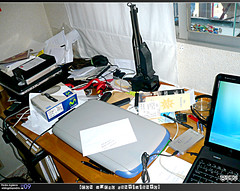 This is the fourth set of tips to avoid burning out in communicative teaching. Check out “Burning out or burning bright?,” “More tips on avoiding burnout,” and “Still more tips on avoiding burnout” for more help on how to stay sane and effective at the same time.
This is the fourth set of tips to avoid burning out in communicative teaching. Check out “Burning out or burning bright?,” “More tips on avoiding burnout,” and “Still more tips on avoiding burnout” for more help on how to stay sane and effective at the same time.
- Organize your bookmarks.
A few weeks ago our filtering software suddenly blocked Delicious and I panicked. What would I do without Delicious? I emailed the company and requested that it be recategorized from “social networking” to “web-based apps” and the site was opened again within a day. Whew.
Delicious and sites like it (such as Diigo) keep track of your resources by labels and are accessible on any device that has internet (sigh, like Pinterest, I suppose). Every year if I want to see what resources I’ve collected for the environment, one of my larger units in AP Spanish, all I do is check my environment tag and I’m reminded of what I’ve found before, instead of having to do new research.
An added benefit of social bookmarking is that you can check my tags too – see what I’ve tagged to practice animals or family and avoid having to do more leg work on your own. (On Delicious I’m both wandermami and musicuentos – anything recent and related to language learning is tagged under the latter account.) - Stop grading everything.
This is a good idea for many reasons, not the least of which is that it will send your students the message that grades are not the only motivation to keep improving and learning. If you do one major assessment in each mode in each unit, that’s a whole lot of grading. Consider alternating the ones you actually assign a grade to and just give formative feedback for the rest. Also check out the helpful assessment tag on the blog for tips on grading, for example, conversations and free-topic writing.
What other tips are useful for you to keep from burning out? Share them here, take what I’ve shared and please, make communicative learning work for you as well as your students.
Foto credit: Pedro Agüera



